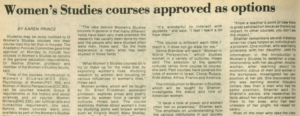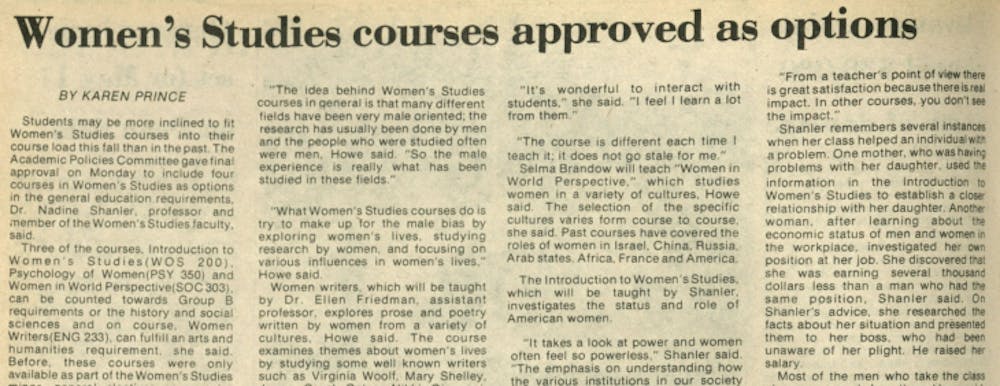Every week, Features Editor Lily Firth hits the archives and finds old Signals that relate to current College topics and top stories.
Recently, the Women’s and Gender Studies major at the College added another component to the major — sexuality. The major now encompasses women’s issues as well as sexual identity and sexual discrimination. In 1984, Women’s and Gender Studies courses were approved to be a part of the general education curriculum to inform students who normally would not have taken these courses about common societal issues rooted in gender.

Students may be more inclined to fit Women's Studies courses into their course load this fall than in the past. The Academic Policies Committee gave final approval on Monday to include four courses in Women's Studies as options in the general education requirements, Dr. Nadine Shanler, professor and member of the Women's Studies faculty, said.
Three of the courses, Introduction to Women's Studies (WGS 200), Psychology of Women (PSY 350) and Women in World Perspective (SOC 303), can be counted towards Group B requirements or the history and social sciences and one course, Women Writers (ENG 233), can fulfill an arts and humanities requirement, she said. Before, these courses were only available as part of the Women's Studies minor, general electives or a major discipline area.
"Having Women Studies' as general education distribution requirements makes them more accessible to students," Dr. Karen Howe, Women's Studies coordinator and assistant professor of psychology, said. "It's a statement by the college that it's important that students take courses that deal with women's lives honestly and openly, past and present," Shanler said.
Howe said she hoped that eventually the subject matter of the Women's Studies courses would be part of the rest of the college curriculum. The lack of focus on women in traditional courses led to the development of the Women’s Studies program, she said.
"The idea behind Women's Studies courses in general is that many different fields have been very male oriented; the research has usually been done by men and the people who were studied often were men, Howe said. "So the male experience is really what has been studied in these fields."
"What Women's Studies courses do is try to make up for the male bias by exploring women's lives, studying research by women and focusing on various influences in women's lives," Howe said. "In Women's Studies, you see people being able to use the information and ideas in their own lives, to deal constructively with relationships at word, at home and literally to make things better.”
Most of the men who take the class also reap rewards from them. Howe said they learn about women, about themselves and about relationships with women. The number of male students in the Women's Studies courses is very few. "They are reluctant to take the course. Some women are afraid to take the course as well."
Women who do take the courses usually feel more positive about themselves. Shanler said. "Women become more sure and more assertive. Often they explore and reevaluate their relationships, values and career aspirations." she said.







